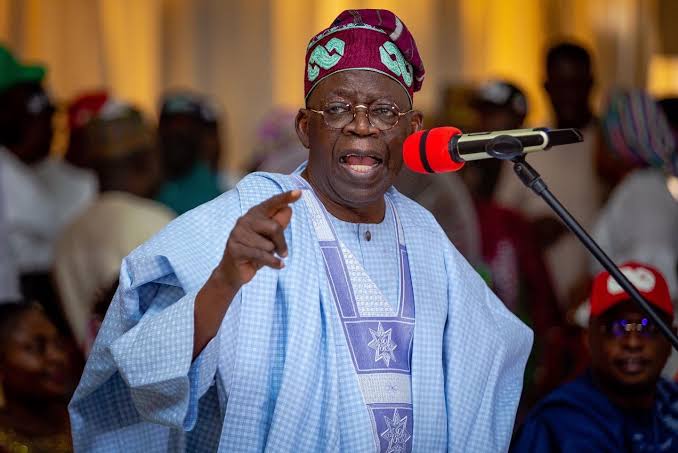The nation’s judiciary has been urged by President Bola Tinubu to implement reforms that will guarantee a functioning judicial system that will support a quickly expanding economy, protect people’s fundamental human and democratic rights, and offer safety and justice to all Nigerians.
He says that when the three branches of government; the Executive, Legislative, and Judicial join forces to recognize the obstacles they face and share ideas for solving Nigeria’s problems, a lot could be accomplished.
The charge was delivered by President Tinubu on Wednesday at the National Summit on Justice 2024, which was hosted at the National Judicial Institute (NJI) in Abuja.
In a statement released by his media aide Stanley Nkwocha, the President who was represented at the event by Vice President Kashim Shettima urged the judiciary to align its actions with the principles of his administration’s Renewed Hope Agenda, especially in relation “to the priorities on inclusivity, fairness, rule of law, and anti-corruption stance, among other things”.
Tinubu stated that the Summit made institutions in the judicial sector available, noting that his administration had promised to be unbiased and uphold constitutional norms “with an opportunity to push boundaries by identifying needed system changes and critical reforms that would allow Nigerians to reap the benefits of huge investments in the sector.”
VP Shettima gave the president’s speech at the function and stated that the federal government is committed to putting its policies and pledges to Nigerians into action so that they might have newfound hope by using the “law and the dictates of justice to create opportunities for our people.”
President Tinubu described the initial steps he took to reposition the judiciary in the effort to support a just and rule-based Nigeria. He noted that his administration prioritized funding for the third arm of government, more than doubling it in the Renewed Hope budget 2024 compared to the previous year’s budget.
He enumerated other measures his administration has taken to realign the judiciary, including his approval of “a substantial increase in the salaries and emoluments of judges, which is currently undergoing legislative action,” and the appointment of the full complement of 21 Justices of the Supreme Court, as required by law for the first time in many years.
Though the justice system has made strides, the President stated that “a functional justice system is urgently needed to support a rapidly growing economy, guarantee basic human and political rights of individuals, and provide security and justice to all.”
President Tinubu went on to say, “Justice sector leaders and professionals need to find the right responses to the challenges we face through policy innovation, citizen-centered reform, systems change, and legislative reform, where necessary. Observing that this is why continued reforms had become imperative.”
“I accordingly urge the leadership of all justice sector institutions to seek a new direction and focus on outcomes by creating a justice system that truly responds to the needs of our citizens – one that serves Nigerians now and for generations to come.
“I demand informed and coordinated responses to the identified challenges plaguing the effectiveness and efficiency of the sector.
“I demand performance so that Nigerians can feel and acknowledge the impact of your reform efforts. Ultimately, the expectations are that law and justice should aim to ensure public safety, economic development, peaceful co-existence, and the well-being of our people.”
Sen. Godswill Akpabio, the president of the Senate, had earlier praised the dedication of all parties involved in the justice system for forging an agreement that will guarantee a stronger legal system that provides justice to everyone, regardless of background or social standing.
He acknowledged the National Assembly’s commitment to a more dynamic and progressive justice system, promising that the legislature would do its share by considering the summit’s conclusions in an effort to codify them into law.
Sen. Akpabio, who insisted that it is morally required to reform the legal system, recommended that important suggestions for revision or review be emphasized and forwarded to the National Assembly in order to guarantee the prompt and equitable administration of justice. He suggested a principled approach in the suggested changes.
Chief Justice of Nigeria, Justice Okukayode Ariwoola, stated that a comprehensive reform of the sector was required in light of the expectations placed on the judiciary.
He stressed that “operational, statutory, and constitutional reforms in the justice sector are imperative in meeting the aspirations and yearnings of the general public.”
The CJN credited the Tinubu administration’s assistance for the majority of the judiciary’s accomplishments, notably the development of judicial officials’ working conditions and welfare.
Similarly, Chief Lateef Fagbemi, the Attorney General of the Federation and Minister of Justice, emphasized the importance of the updated draft national policy on justice, pointing out that creating a national consensus on the improvement of the judicial sector has become imperative.
Yakubu Maikyau, the President of the Nigerian Bar Association (NBA), for his part, praised the leaders in the justice sector for calling the summit and pointed out that changing the sector’s operational procedures and practices was essential to the nation’s overall economic transformation.
Dr. Willy Mutunga, a former chief justice of Kenya, examined constitutional changes, justice system reforms in general, and the repositioning of Kenya and Nigeria for an African justice system in his keynote speech.
Dr. Mutunga examined problems with the judicial systems in Kenya and Nigeria, mentioning the latter’s sharia law system. He claimed that the creation of an African-based body of jurisprudence would significantly contribute to the restoration of public trust in the legal system.
The Chief of Defense Staff, Gen. Christopher Musa, the EFCC Chairman, Mr. Ola Olukoyede, the Chairman of the NDLEA, Maj.-Gen. Buba Marwa (rtd), the Governor of Kwara State, Alhaji Abdulrahman AbdulRazaq, the Deputy President of the Senate, Sen. Barau Jibrin, the Ministers of Information and National Orientation, Alhaji Muhammad Idris, and the Interior, Mr. Olubunmi Tunji-Ojo, Chief Judges from the states, and others were present at the event.
